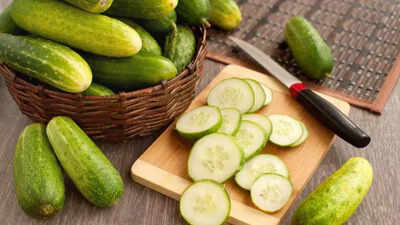ARTICLE AD BOX

Crisp, cool, and quite refreshing! Cucumbers pack a fresh splash whenever you munch on them. Loaded with water, it’s a great summertime snack that not only keeps your body cool, but it also fills your tummy without making you feel bloated.
Whether sliced in salads, eaten with a sprinkle of salt, or blended into smoothies or detox drinks, cucumbers are loved worldwide for their crunch and health benefits.But here’s a question you may not have thought about (or, maybe you have): What is the best time to eat cucumbers? Should you eat cucumbers before a meal or after? But here’s a question many people have: When is the best time to eat cucumbers – before a meal or after? And how much of it is actually healthy?Turns out, timing and quantity can make a difference to your digestion, hydration, and even nutrient absorption.Let’s jot down those questions and find their answers one by one.
Cucumbers: More than just a ‘water-packed snack’
While cucumbers are 95% water, they’re not just “filler food.” They contain vitamin K, potassium, magnesium, antioxidants, and plant compounds like cucurbitacins, which have anti-inflammatory properties. Eating cucumbers helps maintain hydration, supports digestion, and can even aid weight management by making you feel full with fewer calories.
One cup of sliced cucumbers has just 16 calories, making them a guilt-free addition to any diet. But their health perks go beyond the calorie count, and when you eat them can make a difference in how your body uses those nutrients.Bonus points? Cucumbers are rich in silica, a mineral that helps maintain strong connective tissue, and fiber, which supports bowel regularity. This makes them not just a refreshing snack, but also a great addition to a balanced diet.
Before a meal: Appetite control and digestion boost
Eating cucumbers before a meal can work as a natural appetite control trick. Since they’re mostly water and fiber, they can fill you up, helping you eat fewer high-calorie foods during the main course.Nutritionists often recommend eating cucumbers before a meal, especially if you’re aiming for weight control or better digestion. The high water and fiber content can help you feel fuller faster, which may reduce how much you eat afterward.Cucumbers also contain insoluble fiber, which adds bulk to your stool and keeps your digestive system running smoothly. Eating them before a heavier meal can prepare your gut for better digestion. Plus, the extra hydration helps stomach enzymes work more efficiently.Additionally, the water content can help kick-start your digestion by hydrating your stomach lining, which can make it easier for your body to process other foods you eat afterward.
Best for:
Weight managementPreventing overeatingImproving hydration before mealsBoosting fiber intake early in the day
After a meal: Cooling and hydrating
E
ating cucumbers after a meal can be equally beneficial, especially if your goal is better digestion. In that case, cucumbers can act like a refreshing palate cleanser. Their water content helps wash away lingering flavors, while their mild alkalinity may help counteract the acidity of spicy or oily foods. The fiber in cucumbers helps move food along the digestive tract and may prevent post-meal bloating as well.However, if your meal was heavy in starches or fats, having cucumbers afterward won’t slow down calorie absorption, so they’re better as a light finish rather than a digestive “fix.” And if your main meal is high in sodium (like restaurant food), the potassium in cucumbers can help balance electrolytes and reduce water retention.Another perk? A cucumber slice after dinner can be a refreshing, low-calorie alternative to dessert, helping curb sugar cravings without adding extra fat or refined sugar.
Best for:
Easing digestionRefreshing the mouth after spicy mealsPost-meal hydrationBalancing sodium from a salty mealHealthy post-meal snack instead of sweets/heavy calories
Morning vs. evening: Does the time of day matter?
Yes – to some extent. Having cucumbers in the morning can help rehydrate your body after hours of no water during sleep. In the evening, they make a light, low-calorie snack that won’t disrupt your sleep with heavy digestion.If you’re prone to acid reflux, cucumbers are gentle on the stomach and less likely to cause nighttime discomfort compared to acidic or fatty snacks.
How many cucumbers should you eat in a day?
While cucumbers are healthy, too much of anything isn’t ideal.
Eating 1-2 medium cucumbers per day is generally safe for most healthy adults. That gives you plenty of vitamins, minerals, and hydration without overloading on fiber, which in excess could cause bloating or discomfort.If you have kidney problems or are on potassium-restricted diets, talk to your doctor before increasing cucumber intake, as the potassium content, while not extremely high, can add up when combined with other foods.
So… When should you have cucumbers if you want to lose weight?
Cucumbers are a great way to incorporate munching into your diet, which doesn’t leave you with a taste of guilt in your mouth. They’re watery, they curb appetite, prevent overeating, and shoo away bloating. The jewel on the crown of benefits? It helps you shed some pounds, too!So, if weight loss is your goal, eat cucumbers before a meal if you want to curb your appetite, or after a meal if you’re looking for a refreshing, hydrating finish. The ideal portion is about one medium cucumber a day, paired with a balanced diet. Whether sliced into salads, blended into smoothies, or eaten as a crunchy snack, cucumbers are a simple, affordable way to boost your hydration, digestion, and overall health – one cool bite at a time.
Kheera for weight loss: 5 reasons to eat cucumber with every meal



.png)
.png)
.png)
















 1 day ago
9
1 day ago
9










 English (US) ·
English (US) ·